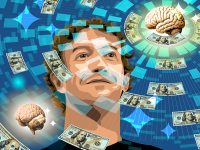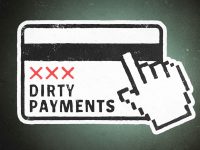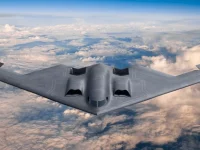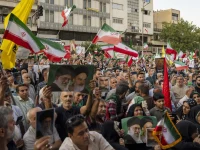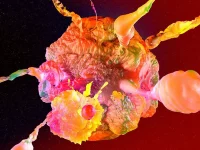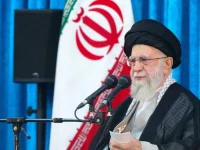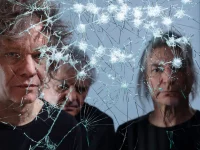Interview. Giorgio Moroder: “I was interested in the hits »

BEAT. Giovanni Giorgio Moroder born Hansjörg Moroder, 26 April 1940 is an Italian record producer, songwriter, performer and DJ. Moroder is frequently credited with pioneering synth disco and electronic dance music.
Mr. Moroder, did girls play a role in your decision to pursue a career in the music industry?
Sure, I was 15 when I started to play guitar. It’s simple, you play a little guitar at parties and the girls are getting interested. I guess I wanted to be a musician anyway, but with the additional allure of having some girls.
Why do you think that musicians are so appealing to girls?
First of all I think women generally like people in the arts – like painters, writers, and of course actors. They like that aura of success. But musicians appeal to girls the most because music speaks to everybody. I guess the girls hear somebody singing “I love you” and they think, “Yeah, of course. He loves me.” There are a lot of reasons, but one is the intimacy that a good song or a great musician develops and projects.
So did it work out for you in the end?
It worked quite well actually, yeah. I resisted finding my ideal woman until I was 50. But after 25 years now I’m still married.
Girls aside, there must have been also a certain song or artist that made you want to be a musician, right?
Yes, it was a song called “Diana” by Paul Anka, who I think at the time was 15 and I was probably 17. It was a simple song with easy English lyrics. That was definitely what made me say not only do I want to play guitar, I want to sing and play at the same time.
Was the decision to change your name from Hansjörg to Giovanni Giorgio part of the process of becoming a professional musician?
I actually didn’t change my name, that is a misconception. My name is Giovanni Giorgio, that’s how it is in my passport and that’s what my birth certificate says. But my mommy called me Hansjörg, it’s a translation from Italian to German, and since we speak Italian and German in South Tyrol she called me Hansjörg. So I actually didn’t change it, my mother changed my name into Hansjörg.
Before you became one of the biggest producers in the world you had your own recording studio called Musicland where legendary artists like Freddie Mercury, Led Zeppelin, and the Rolling Stones recorded. If you wanted to be an artist yourself, why did you build a studio for others?
The initial idea was to have a studio just for myself. But then I think after one month Ariola – the BMG of the ’70s – called me and said that Marc Bolan of T. Rex was looking for a studio. So he took it away for a month or two and I had to go to another studio. After that I went back to work for a month or two and the Rolling Stones came in and took the studio again. So more than half of the time I couldn’t work in my studio.
Why didn’t you say no? It was your place after all…
First of all it made me some money and second if Queen, Led Zeppelin, or the Stones came in I couldn’t say, “No, the studio is booked by me.” They would get upset. So it developed a bit differently than planned.
Since they already kicked you out of your own space, did these bands at least behave in your studio?
As the owner I rarely went down there. You know, I didn’t want to intrude with the recording and I think they behaved quite well, actually.
I read somewhere that a member of Led Zeppelin chased one of your employees with a knife…
I heard that too. I’m not sure, but I think that was all for fun. It was the drummer who got a little bit crazy. You know the English sometimes have a very funny sense of humor.
You had your first small successes with German schlager music, but the big breakthrough came once you discovered the possibilities of a synthesizer. What did that trigger inside of you?
The record that triggered my imagination with the synthesizer was an album called Switched-On Bach by Wendy Carlos, a collection of pieces by Bach played on synthesizers. I realized that the possibilities of synthesizers are endless and that I wanted to translate that into pop music.
Would you agree that the biggest difference between you and a band like Kraftwerk is that you treated the synthesizer more like an instrument than a computer?
Yes, they treated them as a different kind of pop, while I used the synthesizer as a musical instrument. My first song with a synthesizer was called “Son of My Father,” which I think was in ’70 or ’71. I believe that was the first pop song with synthesizer ever. And then later I did “I Feel Love” with Donna Summers, which was all done by synthesizer.
A song that is now considered very influential in the development of electronic pop music. Were you aware what kind of an impact it would have on the industry?
I thought I had something new, but I absolutely didn’t know that it would have such a strong effect. I only realized that a few months later when Brian Eno told David Bowie that he heard the sound of the future in “I Feel Love.” I would have never thought that something like that would come out of Brian Eno.
How freeing was it to be working in a field of music that nobody had explored before?
It was great. I didn’t have any preconception. I just was standing in front of this machine with my engineer wondering what we were going to do. And so I said, “Okay, let’s start with the bassline.” And that is where I came up with (sings bassline) and then I was like, “Okay, now I guess we have to add some chords.” I composed the melody later because it was all done in pieces. I would do 8 bars and then the computer would go out of tune. I guess it is relatively easy to create something new if you are not tied to any rules and if you can do whatever you want. It was a really great time.
Not only did you bring electronic music into pop, but you also managed to revolutionize film music as well.
I guess Alan Parker just trusted my vision and hired me to do the soundtrack for Midnight Express. The interesting thing is that I did it without knowing anything about scoring a film. I was watching movies like everybody else, not thinking about how the music for a movie should sound – I just did it. It was amazing that Alan let me do whatever I wanted. And in the end it actually worked out quite well.
Definitely, you won an Oscar and the doors for new film composers were suddenly wide open. Was it clear to you that your future would be in Hollywood after that?
Yeah, definitely. I got a lot of offers after that like American Gigolo and then later Scarface, et cetera. It was nice to get into these different approaches to music. Normally it was very difficult to transition from pop into the movie business because the movie music composers all came from the classical background back then. It was a big thing for a pop composer to enter this new world.
And because of that you created film music that actually became commercially successful, something that wasn’t very common before. Songs like “Take My Breath Away” from Top Gun and “Flashdance… What a Feeling” became worldwide hits and won you two more Oscars.
I am a commercial composer. The music obviously has to fit the movie, but I was always wondering how it could work on the radio, how could people listen to the song without knowing the movie.
Which hardly happens anymore. Nowadays most directors just take songs that already exist.
Because it has become more difficult to get a big act to write a new song, so they just use one that already exists. This way they know what they will get from the beginning.
When you see films like Drive and The Social Network do you get a smile on your face?
Yeah, I could have done that stuff 20 years ago, but it is nice to hear that people are still remembering those sounds. Obviously it sounds better now – but it still reminds me of the ’80s.
Why did you take a step back from the music industry in the late ’80s?
At one point I didn’t have great offers for movies and I didn’t want to work on anything that I wasn’t really fond of. I have so many other interests, and among other things the retirement. I used to do a lot of nothing actually – playing a little bit of golf and doing a lot of other little things. But when I really wanted to do something I always just did it.
So at the age of 73 you decided that you really wanted to be a DJ?
No, I became a DJ by coincidence, because Louis Vuitton asked me to do a small, 15-minute set for one of their men’s shows in Paris and I liked it. Because of that Elton John’s company asked me to DJ at the amfAR gala in Cannes during the festival and then the Red Bull Music Academy asked me to do a little bit of teaching to the students and at the same time to do a DJ set in a great club in New York and that became a big success. So I continued and now I love it.
Why?
I just came back from Mexico where we had around 20,000 to 30,000 people and yesterday here in L.A. we had probably 7,000 to 8,000 people all jumping up and down. It was absolutely incredible. Being a DJ is great because you are kind of in command up there like a music conductor. You do the highs and the lows and the big moments and the quiet moments, so it is a very interesting job.
Are you still looking for the sound of the future these days?
I am still listening to the charts because I want to stay on top of what is going on, but I rarely check out new stuff because I don’t have time. I don’t want to anymore and it is so much easier if I just listen to the hits because that is what I was always interested in. (The Talks)


